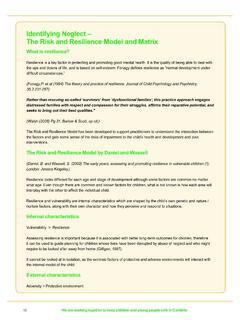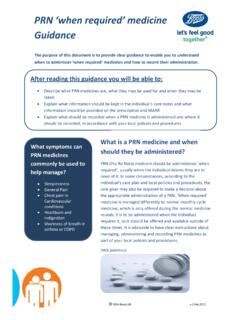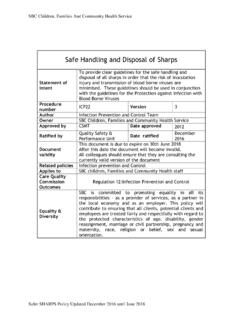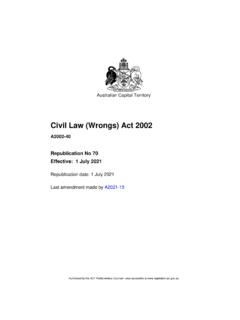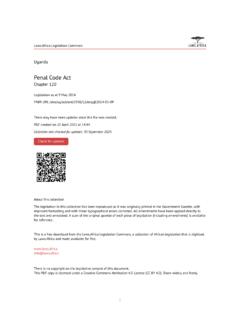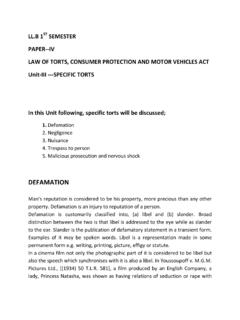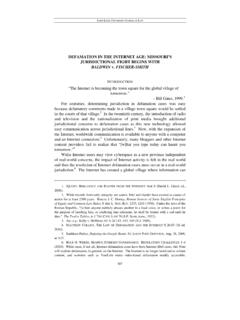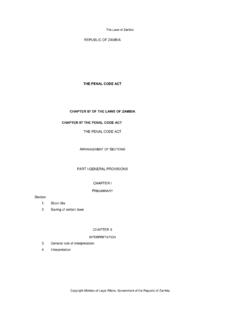Transcription of Patients recording NHS staff in health and social care ...
1 Patients recording NHS staff in health and social care settings May 2016 1 Contents 1. Background ..2 2. Purpose .. 2 3. Risks ..3 4. Potential legal action ..3 5. Precautionary measures ..4 6. 6 7. Contact details .. 6 2 1. Background NHS Protect has received some enquiries that highlighted concerns about the overt and covert recording (both video and audio) of medical consultations or treatments through the use of portable recording devices on NHS premises or CCTV systems installed at home. Concerns were in particular about Patients who covertly record their consultations in their own homes using a hidden camera or mobile device and without the knowledge or permission of those being recorded.
2 Unlike medical professionals, who are expected by the General Medical Council1 to obtain Patients ' consent to make visual or audio recordings, Patients do not need their doctor's permission to record a medical consultation or treatment. Patient recordings which are made either covertly and overtly in order to keep a personal record of what the doctor said are deemed to constitute personal note taking and are therefore permissible. It is, however, recognised that staff need guidance and advice about Patients recording consultations or treatment being administered.
3 NHS Protect has produced the good practice advice in this document for use in health and social care settings. It can be used to provide clarification to NHS clinical and non-clinical staff working within health and social care settings on dealing with situations where Patients are recording their treatment and care. This advice covers both covert and overt recording of consultations. However it predominantly concerns overt recording as the patient will generally ask NHS staff for permission for recording to take place. 2. Purpose This short guide has been developed to provide advice to Local Security Management Specialists (LSMSs) to enable them to support and advise NHS staff on covert and overt recording by Patients .
4 It will also assist LSMSs in raising awareness of the issues within their health bodies. Finally, the guidance can help trusts to develop or review local policies and procedures. In particular, it is recommended that trusts review their current mobile communication devices policy and incorporate the recommendations in this guide where relevant and applicable. This document is meant as guidance only and nothing in it constitutes legal advice. It will be for individual trusts to obtain their own legal advice on any specific case. 3. Risks There are no specific legal requirements that govern an individual making a personal recording of their medical consultation or treatment, either overtly or covertly, for their private use.
5 Recordings made to keep a personal record of what the doctors said are deemed to constitute note taking and are therefore permitted when undertaken for this purpose. While a patient does not require permission to record their consultation, common courtesy would suggest that permission should be sought in most cases. 1 3 The content of the recording is confidential to the patient, not the doctor or healthcare staff . The patient can waive their own confidentiality as they wish; this could include disclosing the details of their consultation with third parties or even posting and/or sharing the recording in unadulterated form on the internet through social media sites.
6 The position may, however, change once a recording is no longer used as a record of the consultation, for example where the recording is disclosed or publicised in a modified way which is not connected to the consultation. This could include an instance where it is designed to cause detriment to or harass another individual captured in the recording . Any such disclosure or publication, depending on the nature and context, may attract a civil action for damages and may also be a criminal offence. For more guidance please read in conjunction with NHS Protect s document Misuse of social media to harass, intimidate or threaten NHS staff .
7 Data Protection Act 1998 The recording of a consultation is likely to constitute processing of personal data under the DPA and as such it has to comply with the provisions of the DPA. There is an exemption in the DPA where personal data is processed by an individual for their own personal purposes. In such cases, the processing does not engage the data protection principles of the act (the domestic purposes exemption). However, further processing of the data would have to comply with the DPA. Information Governance Information governance refers to the legal and procedural framework that safeguards and ensures the appropriate use of patient and personal information by an organisation.
8 It is important to note that a patient s own private recording is not an information governance issue. As the Trust is not responsible for generating or making the recording , it is not liable for safeguarding the confidentiality, integrity or security of such material. 4. Potential legal action If any part of the covert or overt recording of the patient s consultation is disclosed to a third party without the prior consent of the other recorded parties, then depending on the nature and the context of such disclosure, a criminal offence may be committed, civil legal action may be taken, or a breach of the DPA may occur.
9 Criminal offences Criminal offences could arise from unauthorised disclosure, depending on how that disclosure or publication is made. However, the most likely offences could include an offence contrary to section 1 of the Protection From Harassment Act 1997, an offence contrary to section 4, 4A or 5 of the Public Order Act 1986, an offence contrary to section 1 of the Malicious Communications Act 1988 or an offence contrary to section 127 of the Communications Act 2003. This list is not exhaustive and the specific offence charged would depend on the facts.
10 For further information on the provisions of legislation referred to above please see the relevant 4 chapter in the NHS Security Management Manual. Specific advice can be sought from NHS Protect s Legal Protection Unit. Civil action defamation Actions for libel can be brought in the High Court for any published statements which are alleged to defame a named or identifiable individual (or individuaIs; under English law companies are legal persons, and allowed to bring suit for defamation ) in a manner which causes them loss in their trade or profession, or causes a reasonable person to think worse of him, her or them.





